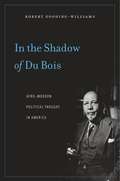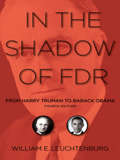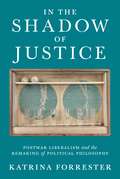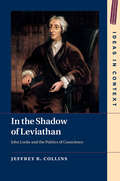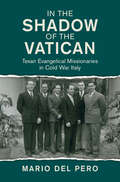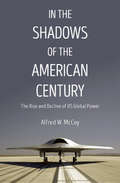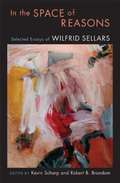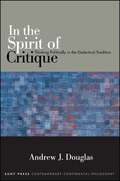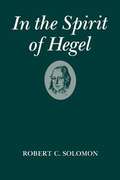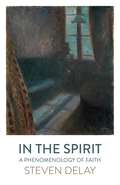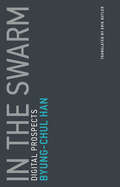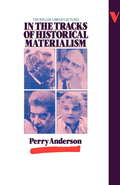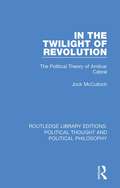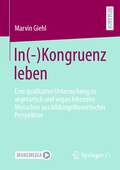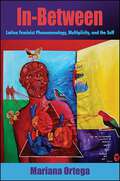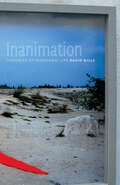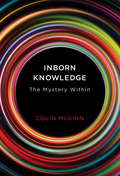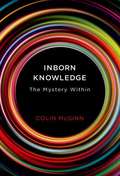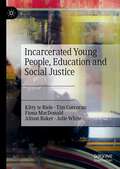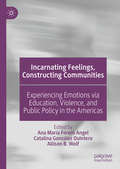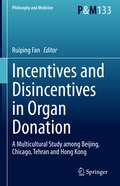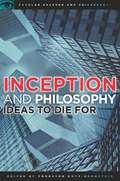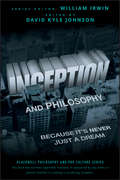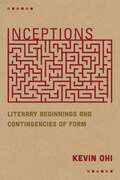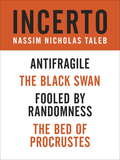- Table View
- List View
In the Shadow of Du Bois: Afro-Modern Political Thought in America
by Robert Gooding-WilliamsThe Souls of Black Folk is Du Bois’s outstanding contribution to modern political theory. It is his still influential answer to the question, “What kind of politics should African Americans conduct to counter white supremacy?” Here, in a major addition to American studies and the first book-length philosophical treatment of Du Bois’s thought, Robert Gooding-Williams examines the conceptual foundations of Du Bois’s interpretation of black politics. For Du Bois, writing in a segregated America, a politics capable of countering Jim Crow had to uplift the black masses while heeding the ethos of the black folk: it had to be a politics of modernizing “self-realization” that expressed a collective spiritual identity. Highlighting Du Bois’s adaptations of Gustav Schmoller’s social thought, the German debate over the Geisteswissenschaften, and William Wordsworth’s poetry, Gooding-Williams reconstructs Souls’ defense of this “politics of expressive self-realization,” and then examines it critically, bringing it into dialogue with the picture of African American politics that Frederick Douglass sketches in My Bondage and My Freedom. Through a novel reading of Douglass, Gooding-Williams characterizes the limitations of Du Bois’s thought and questions the authority it still exerts in ongoing debates about black leadership, black identity, and the black underclass. Coming to Bondage and then to these debates by looking backward and then forward from Souls, Gooding-Williams lets Souls serve him as a productive hermeneutical lens for exploring Afro-Modern political thought in America.
In the Shadow of FDR: From Harry Truman to Barack Obama
by William E. LeuchtenburgA ghost has inhabited the Oval Office since 1945--the ghost of Franklin Delano Roosevelt. FDR's formidable presence has cast a large shadow on the occupants of that office in the years since his death, and an appreciation of his continuing influence remains essential to understanding the contemporary presidency. This new edition of In the Shadow of FDR has been updated to examine the presidency of George W. Bush and the first 100 days of the presidency of Barack Obama. The Obama presidency is evidence not just of the continuing relevance of FDR for assessing executive power but also of the salience of FDR's name in party politics and policy formulation.
In the Shadow of Justice: Postwar Liberalism and the Remaking of Political Philosophy
by Katrina ForresterA history of how political philosophy was recast by the rise of postwar liberalism and irrevocably changed by John Rawls’s A Theory of JusticeIn the Shadow of Justice tells the story of how liberal political philosophy was transformed in the second half of the twentieth century under the influence of John Rawls. In this first-ever history of contemporary liberal theory, Katrina Forrester shows how liberal egalitarianism—a set of ideas about justice, equality, obligation, and the state—became dominant, and traces its emergence from the political and ideological context of the postwar United States and Britain.In the aftermath of the civil rights movement and the Vietnam War, Rawls’s A Theory of Justice made a particular kind of liberalism essential to political philosophy. Using archival sources, Forrester explores the ascent and legacy of this form of liberalism by examining its origins in midcentury debates among American antistatists and British egalitarians. She traces the roots of contemporary theories of justice and inequality, civil disobedience, just war, global and intergenerational justice, and population ethics in the 1960s and ’70s and beyond. In these years, political philosophers extended, developed, and reshaped this liberalism as they responded to challenges and alternatives on the left and right—from the New International Economic Order to the rise of the New Right. These thinkers remade political philosophy in ways that influenced not only their own trajectory but also that of their critics.Recasting the history of late twentieth-century political thought and providing novel interpretations and fresh perspectives on major political philosophers, In the Shadow of Justice offers a rigorous look at liberalism’s ambitions and limits.
In the Shadow of Leviathan: John Locke and the Politics of Conscience (Ideas in Context #127)
by Jeffrey R. CollinsThomas Hobbes and John Locke sit together in the canon of political thought but are rarely treated in common historical accounts. This book narrates their intertwined careers during the Restoration period, when the two men found themselves in close proximity and entangled in many of the same political conflicts. Bringing new source material to bear, In the Shadow of Leviathan establishes the influence of Hobbesian thought over Locke, particularly in relation to the preeminent question of religious toleration. Excavating Hobbes's now forgotten case for a prudent, politique toleration gifted by sovereign power, Jeffrey R. Collins argues that modern, liberal thinking about toleration was transformed by Locke's gradual emancipation from this Hobbesian mode of thought. This book investigates those landmark events - the civil war, Restoration, the popish plot, the Revolution of 1688 - which eventually forced Locke to confront the limits of politique toleration, and to devise an account of religious freedom as an inalienable right.
In the Shadow of the Vatican: Texan Evangelical Missionaries in Cold War Italy (Cambridge Studies in US Foreign Relations)
by Mario Del PeroIn 1948, joining the wave of post-World War II evangelical missionary activism, the small, nondenominational Church of Christ from Lubbock, Texas, decided to establish its own mission in Italy. The missionaries believed that by promoting religious freedom, they would help spread democracy and American values. But they were also motivated by fervent anti-Catholicism and a conviction that they could challenge the Vatican's near monopoly on religion in Italy. Their zeal and naivety were met with a harsh response from the Catholic Church and its allies within the Italian government. At the same time, the omnipresent Cold War soon forced all the actors involved to adapt their strategies and rhetoric to leverage the situation to their advantage.
In the Shadows of the American Century: The Rise and Decline of US Global Power (Dispatch Books)
by Alfred W. McCoyThe award-winning historian delivers a &“brilliant and deeply informed&” analysis of American power from the Spanish-American War to the Trump Administration (New York Journal of Books).In this sweeping and incisive history of US foreign relations, historian Alfred McCoy explores America&’s rise as a world power from the 1890s through the Cold War, and its bid to extend its hegemony deep into the twenty-first century. Since American dominance reached its apex at the close of the Cold War, the nation has met new challenges that it is increasingly unequipped to handle.From the disastrous invasion of Iraq to the failure of the Trans-Pacific Partnership, fracturing military alliances, and the blundering nationalism of Donald Trump, McCoy traces US decline in the face of rising powers such as China. He also offers a critique of America&’s attempt to maintain its position through cyberwar, covert intervention, client elites, psychological torture, and worldwide surveillance.
In the Space of Reasons: Selected Essays of Wilfrid Sellars
by Wilfrid SellarsThis collection, co-edited by Sellar's chief interpreter and intellectual heir, should do much to elucidate and clearly establish the significance of this difficult thinker's vision for contemporary philosophy. Edited and introduced by Robert B. Brandom and Kevin Scharp
In the Spirit of Critique: Thinking Politically in the Dialectical Tradition (SUNY series in Contemporary Continental Philosophy)
by Andrew J. DouglasFocusing on the critical postures of Hegel, Marx, and a series of twentieth-century intellectuals, including Sartre, Adorno, and C. L. R. James, this book explores what dialectical thinking entails and how such thinking might speak to the lived realities of the contemporary political moment. What is revealed is not a formal method or a grand philosophical system, but rather a reflective energy or disposition—a dialectical spirit of critique—that draws normative sustenance from an emancipatory moral vision but that remains attuned principally to conflict and tension, and to the tragic uncertainties of political life. In light of the unique challenges of the late-modern age, as theorists and citizens struggle to sustain an active and coherent critical agenda, In the Spirit of Critique invites serious reconsideration of a rich and elusive intellectual tradition.
In the Spirit of Hegel: A Study of G.W.F. Hegel's Phenomenology of Spirit
by Robert C. SolomonIn this book, the author captures the bold and exhilarating spirit, presenting the Phenomenology as a thoroughly personal as well as philosophical work. He begins with a historical introduction, which lays the groundwork for a section-by-section analysis of the Phenomenology. Both the initiated and readers unacquainted with the intricacies of German idealism will find this to be an accessible and exciting introduction to this philosopher's monumental work.
In the Spirit: A Phenomenology of Faith
by Steven DeLayIn a series of analysis dealing with issues of basic human concern such as love, hope, joy, beauty, desire, suffering, evil, and death, Steven DeLay articulates an existence of faith in Christ. With attention to the Bible and works of art (Caravaggio, Doré, Pissarro, Poussin, Rembrandt, and Rodin), DeLay explores the depths of the human experience, offering a descriptive account of our personal encounter with God. A contribution to the longstanding tradition of edifying Christian works, In the Spirit extols the glory of being human in light of God's word.
In the Swarm: Digital Prospects (Untimely Meditations #3)
by Byung-Chul HanA prominent German thinker argues that—contrary to “Twitter Revolution” cheerleading—digital communication is destroying political discourse and political action. The shitstorm represents an authentic phenomenon of digital communication.—from In the SwarmDigital communication and social media have taken over our lives. In this contrarian reflection on digitized life, Byung-Chul Han counters the cheerleaders for Twitter revolutions and Facebook activism by arguing that digital communication is in fact responsible for the disintegration of community and public space and is slowly eroding any possibility for real political action and meaningful political discourse. In the predigital, analog era, by the time an angry letter to the editor had been composed, mailed, and received, the immediate agitation had passed. Today, digital communication enables instantaneous, impulsive reaction, meant to express and stir up outrage on the spot. “The shitstorm,” writes Han, ”represents an authentic phenomenon of digital communication. ”Meanwhile, the public, the senders and receivers of these communications have become a digital swarm—not a mass, or a crowd, or Negri and Hardt's antiquated notion of a “multitude,” but a set of isolated individuals incapable of forming a “we,” incapable of calling dominant power relations into question, incapable of formulating a future because of an obsession with the present. The digital swarm is a fragmented entity that can focus on individual persons only in order to make them an object of scandal. Han, one of the most widely read philosophers in Europe today, describes a society in which information has overrun thought, in which the same algorithms are employed by Facebook, the stock market, and the intelligence services. Democracy is under threat because digital communication has made freedom and control indistinguishable. Big Brother has been succeeded by Big Data.
In the Tracks of Historical Materialism
by Perry AndersonWhat have been the major changes in the intellectual landscape of the left since the mid seventies? Have they on balance represented an emancipation or a retreat for socialist culture as a whole? In the Tracks of Historical Materialism looks at some of the paradoxes in the evolution of Marxist thought in this period. It starts by considering the remarkable and variegated growth of historical materialism in the Anglo-American world, spreading across a broad field from history to economics, politics to literature, sociology to philosophy. By contrast, the same years have seen a drastic recession of Marxist influences in the Latin cultures where it was traditionally strong—France or Italy. Its main theoretical challengers there proved to be successive forms of structuralism and post-structuralism. The common coordinates of these—tracing the outer bounds of the work of Levi-Strauss or Lacan, Foucault or Derrida—are surveyed and criticized, in the light of the inherent limitations of the language model from which they derived. In Germany, on the other hand, the theoretical scene has been largely dominated by the accumulating work of Habermas, with its roots in the Frankfurt School. Yet Habermas's philosophy also reveals unexpected affinities with the trend of prevalent Parisian concerns, in its unifying emphasis on communication—while at the same time diverging from them in the constancy of its political commitments. The historical background of international class struggles against which these variant fates of Marxism in the west were played out is then explored, with special attention to the interconnection between the destinies of Maoism and Eurocommunism. What, finally, is the nature of the relationship between Marxism as a theory and socialism as a goal? A conclusion reviews the wider issues posed for the labour movement by the rise of the peace movement and the women's movement, and suggests a range of priorities for the further development of Marxist thought in the eighties.
In the Twilight of Revolution: The Political Theory of Amilcar Cabral (Routledge Library Editions: Political Thought and Political Philosophy #39)
by Jock McCullochFirst published in 1983. Amilcar Cabral was one of Africa’s leading revolutionary figures. Universally recognised as the founding father at the independent state of Guiné-Bissau, he was also the first truly important political thinker to have emerged from Africa’s two decades of revolution. This book was the first publication to present a critical analysis of his standing as a political theorist. Born in 1925 in the then Portuguese colony of Guiné, Cabral devoted his life to the liberation of his people from colonialism and was instrumental in founding the PAIGC, the African Party for the Independence of Guiné and Cape Verde. He was assassinated early in 1973, but the PAIGC continued his task and Guiné-Bissau gained independence in September 1973. Guiné’s revolution came late, but it was a genuine revolution and, like all revolutions, was accompanied by a theory of its own. That theory is found in the writings of Cabral. In this study Jack McCulloch explains that, because of the conjunction of a number of historical factors, the revolution in Guiné assumed an importance for out of proportion to the size or economic significance of the country, and shows that consequently Cabral’s theory has come to have an historical significance of its own. This account of Cabral’s political theory demonstrates clearly that the effect of Cabral’s career was to help bring down the last of the great colonial empires in Africa and, in the realm of theory, to dismantle the central shibboleths of African socialism.
In(-)Kongruenz leben: Eine qualitative Untersuchung zu vegetarisch und vegan lebenden Menschen aus bildungstheoretischer Perspektive
by Marvin GiehlMarvin Giehl zeigt den im erziehungswissenschaftlichen Diskurs bislang unterrepräsentierten Konnex zwischen den ethisch motivierten Ernährungs- und Lebensformen des Vegetarismus und des Veganismus sowie deren biographischer Genese und bildungstheoretischen Überlegungen auf. Durch die Erhebung qualitativer Interviews und die Auswertung im Stile der dokumentarischen Methode entwirft der Autor mehrere datenbegründete Typiken, welche die Komplexität von ‚vegetarischen‘ und ‚veganen‘ Biographien rekonstruieren. Virulent wird dabei ein spannungsreiches Wechselspiel von erlebter Inkongruenz und Kongruenz. Mit dem Forschungsergebnis legt er eine neue Betrachtung von post-anthropozentrisch gedachten biographischen Bildungsprozessen vor, woraus auch praktische pädagogische Implikationen abzuleiten sind. Schließlich erweitert die Arbeit die Perspektiven im methodologischen Diskurs, indem sie bislang vorherrschende und reproduzierte Fokussierung auf konjunktive Wissensbestände und die damit korrespondieren Wissensformen durch die analytische Berücksichtigung von kommunikativem Wissen ergänzt.
In-Between: Latina Feminist Phenomenology, Multiplicity, and the Self (SUNY series, Philosophy and Race)
by Mariana OrtegaThis original study intertwining Latina feminism, existential phenomenology, and race theory offers a new philosophical approach to understanding selfhood and identity. Focusing on writings by Gloría Anzaldúa, María Lugones, and Linda Martín Alcoff, Mariana Ortega articulates a phenomenology that introduces a conception of selfhood as both multiple and singular. Her Latina feminist phenomenological approach can account for identities belonging simultaneously to different worlds, including immigrants, exiles, and inhabitants of borderlands. Ortega's project forges new directions not only in Latina feminist thinking on such issues as borders, mestizaje, marginality, resistance, and identity politics, but also connects this analysis to the existential phenomenology of Martin Heidegger and to such concepts as being-in-the-world, authenticity, and intersubjectivity. The pairing of the personal and the political in Ortega's work is illustrative of the primacy of lived experience in the development of theoretical understandings of who we are. In addition to bringing to light central metaphysical issues regarding the temporality and continuity of the self, Ortega models a practice of philosophy that draws from work in other disciplines and that recognizes the important contributions of Latina feminists and other theorists of color to philosophical pursuits.
Inanimation: Theories of Inorganic Life (Posthumanities #35)
by David WillsInanimation is the third book by author David Wills to analyze the technology of the human. In Prosthesis, Wills traced our human attachment to external objects back to a necessity within the body itself. In Dorsality, he explored how technology is understood to function behind or before the human. Inanimation proceeds by taking literally the idea of inanimate or inorganic forms of life. Starting from a seemingly naïve question about what it means to say texts &“live on&” or have a &“life of their own,&” Inanimation develops a new theory of the inanimate.Inanimation offers a fresh account of what life is and the ethical and political consequences that follow from this conception. Inspired by Walter Benjamin&’s observation that &“the idea of life and afterlife in works of art should be regarded with an entirely unmetaphorical objectivity,&” the book challenges the coherence and limitations of &“what lives,&” arguing that there is no clear opposition between a live animate and dead inanimate. Wills identifies three major forms of inorganic life: autobiography, translation, and resonance. Informed by Jacques Derrida and Gilles Deleuze, he explores these forms through wide-ranging case studies. He brings his panoptic vision to bear on thinkers (Descartes, Freud, Derrida, Benjamin, Carl Schmitt, Jean-Luc Nancy, Roland Barthes), writers and poets (Hélène Cixous, Paul Celan, William Carlos Williams, Ernst Jünger, James Joyce, Georges Bataille), and visual artists (Jean-François Millet, Jean-Luc Godard, Paul Klee). With panache and gusto, Wills discovers life-forms well beyond textual remainders and translations, in such disparate &“places&” as the act of thinking, the death drive, poetic blank space, recorded bird songs, the technology of warfare, and the heart stopped by love.
Inborn Knowledge: The Mystery Within
by Colin McGinnAn argument that nativism is true and important but mysterious, examining the particular case of ideas of sensible qualities. In this book, Colin McGinn presents a concise, clear, and compelling argument that the origins of knowledge are innate—that nativism, not empiricism, is correct in its theory of how concepts are acquired. McGinn considers the particular case of sensible qualities—ideas of color, shape, taste, and so on. He argues that these, which he once regarded as the strongest case for the empiricist position, are in fact not well explained by the empiricist account that they derive from interactions with external objects. Rather, he contends, ideas of sensible qualities offer the strongest case for the nativist position—that a large range of our knowledge is inborn, not acquired through the senses. Yet, McGinn cautions, how this can be is deeply problematic; we have no good theories about how innate knowledge is possible. Innate knowledge is a mystery, though a fact.McGinn describes the traditional debate between empiricism and nativism; offers an array of arguments against empiricism; constructs an argument in favor of nativism; and considers the philosophical consequences of adopting the nativist position, discussing perception, the mind–body problem, the unconscious, metaphysics, and epistemology.
Inborn Knowledge: The Mystery Within
by Colin McginnIn this book, Colin McGinn presents a concise, clear, and compelling argument that the origins of knowledge are innate -- that nativism, not empiricism, is correct in its theory of how concepts are acquired. McGinn considers the particular case of sensible qualities -- ideas of color, shape, taste, and so on. He argues that these, which he once regarded as the strongest case for the empiricist position, are in fact not well explained by the empiricist account that they derive from interactions with external objects. Rather, he contends, ideas of sensible qualities offer the strongest case for the nativist position -- that a large range of our knowledge is inborn, not acquired through the senses. Yet, McGinn cautions, how this can be is deeply problematic; we have no good theories about how innate knowledge is possible. Innate knowledge is a mystery, though a fact.McGinn describes the traditional debate between empiricism and nativism; offers an array of arguments against empiricism; constructs an argument in favor of nativism; and considers the philosophical consequences of adopting the nativist position, discussing perception, the mind--body problem, the unconscious, metaphysics, and epistemology.
Incarcerated Young People, Education and Social Justice
by Tim Corcoran Fiona MacDonald Julie White Kitty te Riele Alison BakerThis book foregrounds the provision of education for young people who have been remanded or sentenced into custody. Both international conventions and national legislation and guidelines in many countries point to the right of children and young people to access education while they are incarcerated. Moreover, education is often seen as an important protective and ‘rehabilitative’ factor. However, the conditions associated with incarceration generate particular challenges for enabling participation in education. Bridging the fields of education and youth justice, this book offers a social justice analysis through the lens of ‘participatory parity’, the book brings together rare interviews with staff and young people in youth justice settings in Australia, secondary data from these sites, a suite of pertinent and frank reports, and international scholarship. Drawing on this rich set of material, the book demonstrates not only the challenges but also the possibilities for education as a conduit for social justice in custodial youth justice. The book will be of immediate relevance to governments and youth justice staff for meaningfully meeting their obligation of enabling children and young people in custody to benefit from education; and of interest to scholars and researchers in education, youth work and criminology.
Incarnating Feelings, Constructing Communities: Experiencing Emotions via Education, Violence, and Public Policy in the Americas
by Ana María Forero Angel Catalina González Quintero Allison B. WolfAttempting to connect the academic discussion around the anthropology and philosophy of the emotions to real-life, everyday experiences, this collection brings together concrete cases and situations arising from specific social and political contexts throughout the Americas. In particular, the authors explore how emotions are generated, constructed, discovered, manipulated, and experienced throughout the Americas by exploring undertheorized topics ranging from investigating the emotional lives of prisoners in Colombia and Brazil who have committed “crimes of passion,” to Colombian soldiers’ experiences of core “emotional events,” to the role of emotions in immigration policy in the United States, to how emotions affect educators’ abilities to teach certain material. Taken as a whole, this innovative, interdisciplinary, collection of original essays is not merely comparative, but rather seeks to bring voices and methodologies from North and South America into conversation to generate innovative analyses and ways to reflect about emotions in response to violence, state policies, and educational systems.
Incentives and Disincentives in Organ Donation: A Multicultural Study among Beijing, Chicago, Tehran and Hong Kong (Philosophy and Medicine #133)
by Ruiping FanThis book provides the first systematic study on three types of incentives for organ donation. It covers extensive research conducted in four culturally different societies: Hong Kong, mainland China, Iran and the United States, and shows on the basis of the research that a new model of incentives can be constructed to enhance organ donation in contemporary societies. The book focuses on three types of incentives: honorary incentives, commonly adopted in the United States and other Western countries by offering things such as a thank-you card and a memorial park for donors to encourage donations motivated by pure altruism; compensationalist incentives, adopted in the Islamic Republic of Iran to encourage donation by providing monetary compensation to unrelated living donors for appreciating their altruistic contribution of donation; and familist incentives, implemented in Israel and mainland China to provide priority to organ transplantation to donors and/or their family members. The book demonstrates that a new model of incentives must go beyond offering only one type of incentives and should rather include different types of incentives that are practically effective, politically legitimate and ethically justifiable for particular societies. This implies that suitable incentive measures may vary from society to society to optimize organ donation. This book provides a clear reference for both the scholars and practitioners in the field of organ transplantation, as well as for general readers interested in bioethics and health care policy.
Inception and Philosophy
by Thorsten Botz-BornsteinYou have to go deeper. Inception is more than just a nail-biting heist story, more than just one of the greatest movies of all time. The latest neuroscience and philosophy of mind tell us that shared dreams and the invasion of dreams may soon become reality. Inception and Philosophy: Ideas to Die For takes you through the labyrinth, onto the infinite staircase, exploring the movie's hidden architecture, picking up its unexpected clues. How will Inception change your thinking? You can't imagine. How will Inception and Philosophy change your life? You simply have no idea.
Inception and Philosophy: Because It's Never Just a Dream (The Blackwell Philosophy and Pop Culture Series #43)
by William IrwinA philosophical look at the movie Inception and its brilliant metaphysical puzzles Is the top still spinning? Was it all a dream? In the world of Christopher Nolan's four-time Academy Award-winning movie, people can share one another's dreams and alter their beliefs and thoughts. Inception is a metaphysical heist film that raises more questions than it answers: Can we know what is real? Can you be held morally responsible for what you do in dreams? What is the nature of dreams, and what do they tell us about the boundaries of "self" and "other"? From Plato to Aristotle and from Descartes to Hume, Inception and Philosophy draws from important philosophical minds to shed new light on the movie's captivating themes, including the one that everyone talks about: did the top fall down (and does it even matter)? Explores the movie's key questions and themes, including how we can tell if we're dreaming or awake, how to make sense of a paradox, and whether or not inception is possible Gives new insights into the nature of free will, time, dreams, and the unconscious mind Discusses different interpretations of the film, and whether or not philosophy can help shed light on which is the "right one" Deepens your understanding of the movie's multi-layered plot and dream-infiltrating characters, including Dom Cobb, Arthur, Mal, Ariadne, Eames, Saito, and Yusuf An essential companion for every dedicated Inception fan, this book will enrich your experience of the Inception universe and its complex dreamscape.
Inceptions: Literary Beginnings and Contingencies of Form
by Kevin OhiThe beginning is both internal and external to the text it initiates, and that noncoincidence points to the text’s vexed relation with its outside. Hence the nontrivial self-reflexivity of any textual beginning, which must bear witness to the self-grounding quality of the literary work— its inability either to comprise its inception or to externalize it in an authorizing exteriority. In a different but related way, the fact that they must begin renders our lives and our desires opaque to us; what Freud called “latency” marks not only sexuality but human thought with a self-division shaped by asynchronicity.From Henry James’s New York Edition prefaces to George Eliot’s epigraphs, from Ovid’s play with meter to Charles Dickens’s thematizing of the ex nihilo emergence of character, from Wallace Stevens’s abstract consideration of poetic origins to James Baldwin’s, Carson McCullers’s, and Eudora Welty’s descriptions of queer childhood, writers repeatedly confront the problem of inception. Inception introduces a fundamental contingency into texts and psyches alike: in the beginning, all could have been otherwise.For Kevin Ohi, the act of inception, and the potential it embodies, enables us to see making and unmaking coincide within the mechanism of creation. In this sense, Inceptions traces an ethics of reading, the possibility of perceiving, in the ostensibly finished forms of lives and texts, the potentiality inherent in their having started forth.
Incerto 4-Book Bundle: Fooled by Randomness, The Black Swan, The Bed of Procrustes, Antifragile (Incerto)
by Nassim Nicholas TalebNassim Nicholas Taleb's landmark Incerto series is an investigation of luck, uncertainty, probability, opacity, human error, risk, disorder, and decision-making in a world we don't understand, in nonoverlapping and standalone books. All four volumes--Antifragile, The Black Swan, Fooled by Randomness, and the special expanded edition of The Bed of Procrustes, updated with more than 50 percent new material--are now together in one ebook bundle. ANTIFRAGILE "Startling . . . richly crammed with insights, stories, fine phrases and intriguing asides."--The Wall Street Journal Just as human bones get stronger when subjected to stress and tension, many things in life benefit from disorder, volatility, and turmoil. What Taleb has identified and calls "antifragile" is that category of things that not only gain from chaos but need it in order to survive and flourish. The resilient resists shocks and stays the same; the antifragile gets better and better. What is crucial is that the antifragile loves errors, as it incurs small harm and large benefits from them. Spanning politics, urban planning, war, personal finance, economic systems, and medicine in an interdisciplinary and erudite style, Antifragile is a blueprint for living in a Black Swan world. THE BLACK SWAN "The Black Swan changed my view of how the world works."--Daniel Kahneman, Nobel laureate A black swan is a highly improbable event with three principal characteristics: It is unpredictable; it carries a massive impact; and, after the fact, we concoct an explanation that makes it appear less random and more predictable. The astonishing success of Google was a black swan; so was 9/11. In this groundbreaking and prophetic book, Taleb shows that black swan events underlie almost everything about our world, from the rise of religions to events in our own personal lives, and yet we--especially the experts--are blind to them. FOOLED BY RANDOMNESS "[Fooled by Randomness] is to conventional Wall Street wisdom approximately what Martin Luther's ninety-five theses were to the Catholic Church."--Malcolm Gladwell, The New Yorker Are we capable of distinguishing the fortunate charlatan from the genuine visionary? Must we always try to uncover nonexistent messages in random events? Fooled by Randomness is about luck: more precisely, about how we perceive luck in our personal and professional experiences. Set against the backdrop of the most conspicuous forum in which luck is mistaken for skill--the markets--Fooled by Randomness is an irreverent, eye-opening, and endlessly entertaining exploration of one of the least understood forces in our lives. THE BED OF PROCRUSTES "Taleb's crystalline nuggets of thought stand alone like esoteric poems."--Financial Times This collection of aphorisms and meditations expresses Taleb's major ideas in ways you least expect. The Bed of Procrustes takes its title from Greek mythology: the story of a man who made his visitors fit his bed to perfection by either stretching them or cutting their limbs. With a rare combination of pointed wit and potent wisdom, Taleb plows through human illusions, contrasting the classical views of courage, elegance, and erudition against the modern diseases of nerdiness, philistinism, and phoniness.
